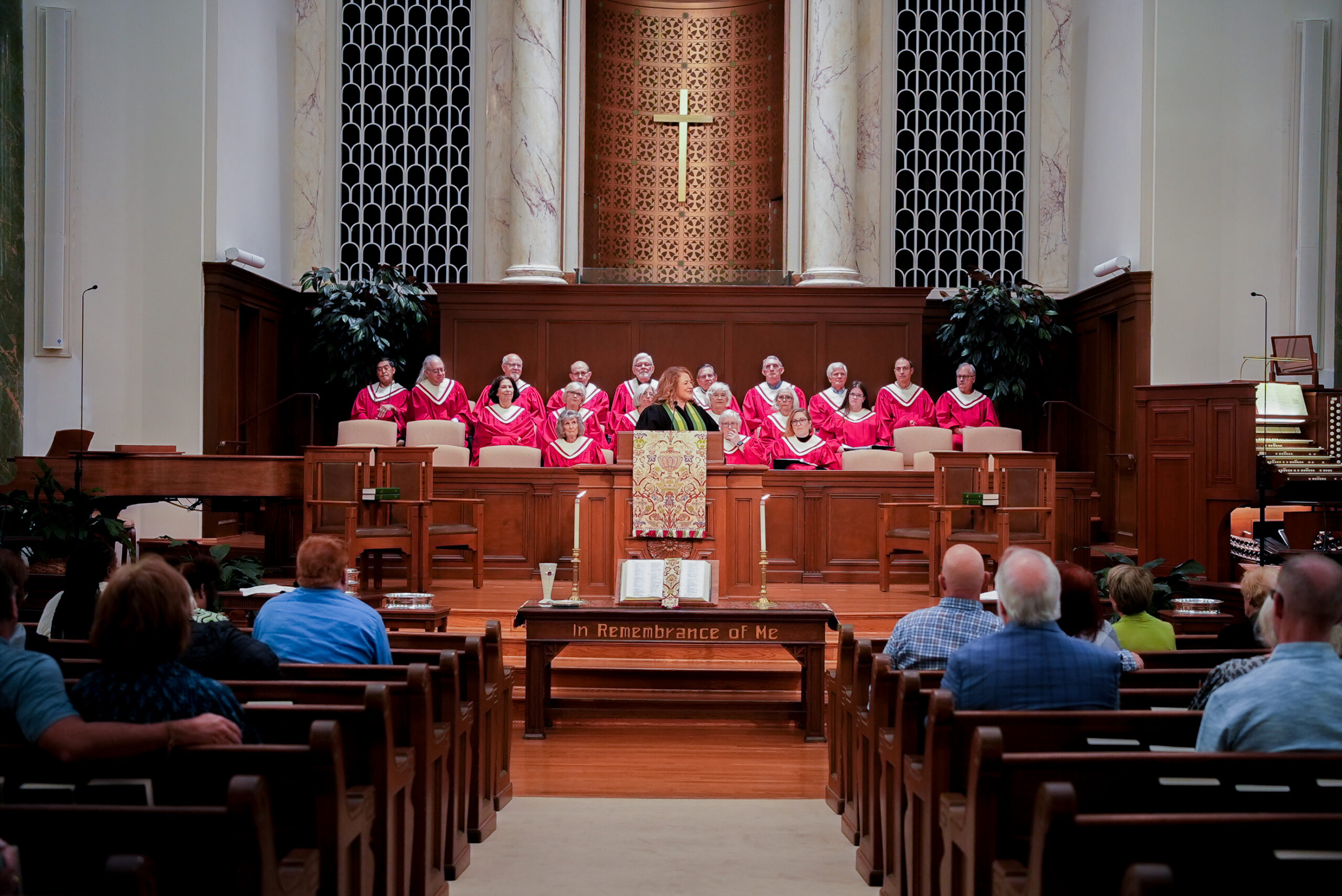II’ve told you before the story from Indian priest Anthony de Mello that
went something like this:
“A rich industrialist from the North was horrified to find a Southern
fisherman lying leisurely beside his boat. ‘Why aren’t you fishing?’ asked the
industrialist.
‘Because I have caught enough fish for the day,’ said the fisherman.
‘Why don’t you catch some more?’
‘What would I do with them?’
‘You could earn more money,’ said the industrialist. ‘With that, you
could fix a motor to your boat, go into deeper waters and catch more fish.
Then you would make enough money to buy nylon nets. These would bring
you more fish and more money. Soon you would have enough money to own
two boats… maybe even a fleet of boats to pass down to your sons. Then you
would be a rich man like me.’
‘What would I do then?’
‘Then you could really enjoy life.’
‘What do you think I am doing right now?’ said the fisherman.”
Temptation comes in all forms, doesn’t it? Or as Fred Craddock said,
“we aren’t tempted to do what we cannot do, but what is within our power.”
IIIn these January weeks, we’re journeying with Jesus in the early
moments of his ministry in the world with Matthew, the gospel writer, as our
guide. Last Sunday, we entered the waters of baptism with Jesus, being
immersed with him within the belovedness of God before ever earning a drop
of that grace. Appropriate, I think, that baptism was Jesus’ first public act,
because from the waters he moves to the wilderness. And as I’ve sat with this
text this week, I am more convinced than ever that Jesus’ baptism and season
in the wilderness are like two sides of the same coin, both a piece of each
other.
This text of Jesus’ temptation in the wilderness is one we most often
hear and contextualize each year on the first Sunday of Lent, those forty days
of penitence and reflection that precede Easter. We often cede that seasonal
invitation to deepen into a wilderness of our spirit, to let the wind whistle
through the spare limbs of our lives, to be humbled by the raw landscape
around us. Considering Jesus’ temptation within the context of our own –
particularly cocooned within the spiritual disciplines of Lent – makes for a
sober start to our path to cross and tomb.
Yet I wonder what this passage might teach us outside of its familiar
contours of Lent, when New Year’s resolutions are a fortnight into practice
(and perhaps already discarded), when the new year offers us the turning of a
page to look carefully at the things in our life that have grabbed hold of our
attention, our energies, our money, our loyalty, luring us away from the
immersive truth of our inherent belovedness.
IIILet’s start with a word about the characters in the story other than
Jesus himself. First: the Spirit. Fresh from an appearance at the waters of
Jesus’ baptism, it is the Spirit who leads Jesus into the wilderness for what
becomes of his temptation, she who guides him there. It’s as if the Spirit, so
wholly connected to God as the breath of God, knew that in order to trust his
belovedness, Jesus had to take a few steps away from it.
Then: the tempter himself, the one Matthew calls “the devil.” Now:
whatever your perspective might be on this character – personified
throughout our holy scriptures as a mosaic of a fallen angel from the
beginning, seen as serpent in Genesis and dragon in Revelation, named
Lucifer and Leviathan and Satan – no matter if you experience him as a
flesh-and-blood fiend or a force of evil in the world, every time we hear one of
these references, it opens our understanding to think of the devil as all that
stands in adverse relationship to God, or as one scholar says, “all those who
obstruct and resist what God intends for human life.”
Like that story of the fisherman, each of the temptations that Jesus
experienced by the tempter was a good thing distorted. Bread is good! Jesus
will later feed the thousands with it, then hold it up to his disciples and claim
it as his body given for them. Bread nourishes and meets a bodily need, and
Jesus was starving, Matthew tells us! What’s the big deal about turning some
stones into rolls? What’s it to him to just use his power to meet his needs?
Without success, the tempter tries again, this time to have Jesus call
upon his unique relationship with God for his own safety. And God is good,
right? Jesus will later act on behalf of God to bring healing and cure disease,
to teach and to guide, to reorder unjust systems and turn eyes and hearts
towards God’s coming dream for the world. What’s the big deal about
throwing himself off the cliff and letting the angels keep him safe? What harm
could it bring to put that on display a bit?
For a third and final time, Jesus hears an invitation, to receive all that is
already his if only he’d worship the one whose temptations he hears. Power is
good, particularly in Jesus’ hands! And knowing how Jesus’ eventual death
and resurrection will lift him above any kingdom of this world, what’s the big
deal about a quick bow? What harm would occur if he took an abbreviated
trip to that end, hopping over the suffering and getting right on to the
victory?
Bread, safety, power; what satiates, what confirms, what quickens. In
each of these offerings, the tempter attempts for Jesus to shortcut his way
through the wilderness: to make small the vast ministry of his calling, to limit
his trust of God instead of leaning fully into his faith, to skip the messy middle
of life and get right onto the win.
We who read this text can often wonder: are these Jesus-specific
temptations? Are they uniquely tailored to the Son of God, or are these also ones
that I mightsuccumb to as well? But let’s remember — long before these
temptations faced Jesus, they faced the people of Israel: bread, safety, and
power: all three, in that order, fresh from their deliverance out of Egypt in the
wilderness. These are ancient attractions, ones that have been set before the
people of God in the world, a story retelling itself with each new generation
to enter it. But where Israel was tested and stumbled, Jesus was tested and
remained faithful to God, confirming the identity conferred upon him in the
waters of baptism.
And what of us? What might these unholy invitations look like in the
shape of a 2023 life? These ancient temptations Jesus faced in the wilderness
were for bread, power, and safety, ones so deeply woven into our psyche, but
they could just have easily been for water, success, and legacy… or intimacy,
wealth, and being right… or all manner of other temptations as we
understand them. In the same way, the temptations you and I face may look
at first glance like opportunities or potential achievements ahead, like the
very possibility you’ve been waiting for, or the miracle drug that will cure
what ails. Indeed at first glance, temptations look reasonable and fair. That’s
why they’re tempting! Why not meet my immediate needs? Why not test the
reach of my authority? Why not claim what I know will be mine?
But as we all know – temptations distort. They ask you to winnow what
is wide, to test what is already sure, to clip what, by its very essence, needs to
take time. What may begin as a desire for justice may actually be the thing
that keeps you perpetually angry; what started with kind companionship of a
friend in need becomes a never-satisfied need to be needed; what once was a
love for all sorts of experiences in this life becomes a gluttonous, distracted
rout through people and places and things, never ever satisfied; what
originated as a needed corrective toward self-care from the implicit
encouragement we might feel as Christians in the South of “helping everyone
else at your own expense” becomes a zealous hoarding of our time and
energy lest we be inconvenienced; what arose as drive and ambition becomes
an unstoppable, unencumbered quest for success.
For indeed,these are less temptations to do what we really wantto
do, and more temptations to be someone other than who God would have
us to be.
IVJust this week I had a conversation with one of you, and you said to me,
“you know, I just never feel like I am enough. I never feel like I’m enough! I
wake up every morning, and I already feel like my day begins with a deficit.
There are things I didn’t get done yesterday. I overslept. The dirty dishes are
still in the sink. I didn’t make it to the gym. I get to work, and there’s a pile of
emails and tasks already waiting for me. My kids got mad at each other that
morning. The day unfolds, and it’s all a mess: I’m running behind, my spouse is
unhappy with me, my kids are wild, and I get to the end of the day wondering,
“when is it going to stop, this feeling of never being enough? When isit going to
stop?”
And yet, almost as if this is the other half of the story we heard last
week, in our baptism, God says, “this is my child, my beloved, in whom I am
well-pleased. These are my children, my beloveds, in whom I am well pleased.
You are enough! There is nothing you can do to earn your way there. You
already have it. It is already yours.”
Indeed those temptations that lead us to think we need to do what we
really want to do instead of being who we already are? Those are the deepest
traps of them all. And that place of feeling like we’re never enough? That, I
think, is where temptation really begins.
No matter who we are, these are the temptations we face. Augustine,
that great church leader and philosopher of the 4th century, wrote a series of
theological writings called Confessions, considered widely to be among the
most important books ever written. It was there in his Confessions we hear
Augustine wrestling with his temptations and how God invited him towards
repentance. Those moments of turning away from temptation and turning
toward God were half-hearted at best. Translated from the Latin, Augustine
wrote: “Give me chastity and continence,” he said, “but not yet.”
VIn the words of a dear friend, “if Jesus went to the desert to find out just
what it meant to be Jesus, perhaps this desert of reflection is where you can
find even more of what it means to be you.” Perhaps for you, these fresh
winter days can be spent with the Spirit and the tempter alike, listening
carefully to what beckons and remembering what grounds you in God’s
unconditional love and care for you. Perhaps for you, the same angels that
ministered to Jesus can surround you and remind you of your identity as
beloved. Perhaps for our church, these winter weeks can be for us a season
when we discover the distinct shape of our obedience, discovering more fully
who and whose we are. And perhaps when we find our way home by way of
the wilderness, we’ll recognize who we’ve been all along — the ones God calls
‘beloved.’ Amen!






